Opinion

I began to watch the show due to my love of sci-fi but the reason I finished all 218 episodes and remained faithful even throughout the 2016 reboot is because of Dana Scully. There’s not a more complex TV character than Scully: She is a medical doctor who knows karate and although she openly antagonizes her partner, Mulder, for placing stock in supernatural explanations instead of logical ones, she openly identifies as Catholic. Scully’s complexity gets to the heart of what the show is all about: the desire to believe.
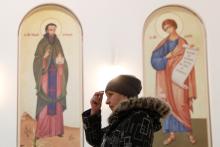
The forces that incite and fuel war can feel inevitable. Even as the Olympics events proceed — a time traditionally greeted by at least temporary truces — reports show that the Russian Federation is once again amassing troops and military hardware along its border with Ukraine. U.S. military and intelligence assessments estimate that a conflict could result in as many as 50,000 Ukrainian civilian casualties and create up to 5 million refugees — all because of a power struggle between NATO, Europe, the United States, and Russia for dominance in the region and control over fuel supply chains. While the forces of imperialism seem inescapable, the role of the church is to show the way out.

When it was announced that Super Bowl LVI would be held in Los Angeles, advocates for the unhoused in the city knew what would come next. We’ve seen it year in and year out.

Danny McBride’s HBO show The Righteous Gemstones is a dark comedy about corrupt, hyper-wealthy Christian pastors. The Gemstone family runs a famously successful megachurch in South Carolina, but behind the scenes, they evade taxes, snort cocaine, pull knives on their friends, bicker like filthy-mouthed children, and say things like, “You are forgiven for my suspicions of you.” And though they all live in mansions on the same compound, patriarch Eli Gemstone and his three adult children — Jesse, Judy, and Kelvin — generally only come together in spirit when they need to ward off blackmailers, snoops, and evil grifters from their past: anyone who might reveal their secrets or jeopardize the family’s wealth-hoarding.

It’s certainly ironic, but as much as the news can get me down it can also lift me up. Yes, legislators are attempting to censor books that teach about racial (in)justice and human sexuality — Weeble down. But these lawmakers’ attempts to censor theories are only resulting in increased interest and open-mindedness among their constituents — Weeble up!

Given widespread efforts to erase or whitewash parts of U.S. history — as school board meetings across the country become battlegrounds over what and how the next generation will be taught that history — Black History Month serves as a corrective to ensure our understanding of history includes the good, the bad, and even the ugliest parts. While the history of Black people in the United States should be studied year-round, February — which every president since Gerald Ford has proclaimed as Black History Month — also presents a critical opportunity to celebrate the contributions of Black Americans proactively, honestly, and specifically.
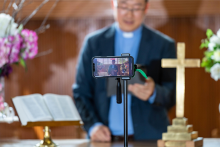
When I asked members of our worship commission what they thought the future of hybrid church might be for us, Rosene wisely reminded us that there are many aging people in our congregation. Before we didn’t have the capacity or technology to continue to include these older adults and disabled people in our regular Sunday worship. What a gift that now we could!
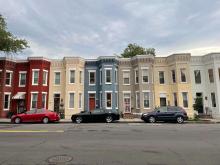
My favorite place in the Sojourners’ Fellowship house is the chair by the window. Each morning, I tiptoe through the dark house, flip on a lamp, and turn on the kettle. I center myself in the lingering darkness of the previous night.
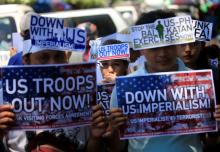
Due to climate change, people — entire tribes and cultures — are losing their homes and are being displaced from their lands. Indeed, the United States military needs to be held accountable for polluting the planet. For example, if preventive measures and legislation like the Green New Deal are not enacted to curb U.S. imperialism, more Indigenous peoples will perish due to climate disasters.
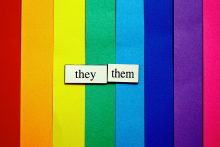
Most English translations of the Bible use exclusively masculine pronouns to refer to God, and the presumed maleness of God has become the default mindset of many Christians. But does the precedence of masculine pronouns require Christians to refer to God only with masculine pronouns forever?
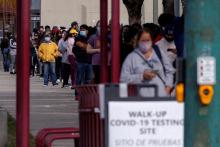
In January 2020, COVID-19 was first detected in United States. In the two years since, we’ve experienced death and mourning on a massive scale, lost relationships over politically driven misinformation about the deadly virus, and felt constant fear and anxiety as we try to protect ourselves and our loved ones. This trauma has shaken many to their spiritual core in ways that will leave lasting effects. As the omicron variant rips through communities, I’ve heard many people express feelings of resignation. Helplessness. Hopelessness. And given how trauma works, we shouldn't be surprised when notice ourselves experiencing these feelings, even in our churches.
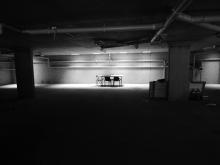
I believe the material histories and needs of marginalized people demand structural change and not merely a “seat at the table.” As ethnic studies professor Jodi Kim summarizes, “one does not have to be cynical to observe that this liberal or corporate multiculturalism, with its politics of symbolic, imagistic, or cultural representation has replaced, rather than complemented, substantive political representation or redistribution of wealth and power.” The language of representation can present progress but in reality, it is the path toward homogenization.

As part of the Catonsville Nine, the rebel priest Daniel Berrigan joined eight other Catholic activists in setting fire to hundreds of draft files with homemade napalm. It was 1968 and he was protesting the Vietnam War. The way he evaded prison was perhaps as memorable as the crime he committed.

Paul offers a reflection on accountability and community care when he uses the metaphor of a body for the community, writing, “If one member suffers, all suffer together with it; if one member is honored, all rejoice together with it” (1 Corinthians 12:26). Accountability requires seeing that we all belong to one another as members of the human community. This is why efforts to distinguish between the vaccinated and unvaccinated, the “healthy” and the “disabled,” the “deserving” and “undeserving” is antithetical to an ethic of accountability.

On New Year’s Eve, exactly five cats cuddled on Starlink user Aaron Taylor’s dish, slowing down his movie-streaming experience. “Starlink works great until the cats find out that the dish gives off a little heat on cold days,” he wrote in a now viral tweet.

Carrie Newcomer, a musical light-bearer, is a Quaker singer-songwriter who has inspired listeners throughout her career. Her latest release, Until Now (Available Light Records), offers an salve of spiritual renewal. In the past few years we have been through difficult terrain politically and culturally; Newcomer’s music is like dipping our hands in a baptismal font.
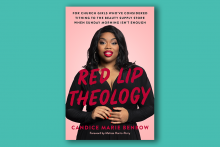
In her new book, theologian Candice Marie Benbow takes readers on a journey through some pivotal and transformational moments in her life, highlighting the conversations she had with her mother, the theology informing her, and the sources — such as literature and hip-hop — that have shaped who she is. Red Lip Theology: For Church Girls Who’ve Considered Tithing to the Beauty Supply Store When Sunday Morning Isn’t Enough is an invitation to reflect on the moments, the people, and the religious institutions that have contributed to making us who we are.

My friend Myca pointed out that Encanto doesn't have a villain. Disney villains are almost as popular as the princesses — they even have their own board game. And the animated movie Encanto, available for streaming on Disney+, would seem ripe for villainy. The magical Madrigal family at the heart of the film begins to lose the magic that made them special — surely someone is to blame! But no one lurks in the shadows, twirling a mustache and absconding with magic. Instead, the story of Encanto is one of families, systems, and prophets — one that can serve as a warning and a balm to churches struggling to cope with a changing world.

One of the best jobs I ever held was assistant manager at Grace Records. I was a founding staff member at the new and used vinyl shop in Arizona, a father and son venture that was a thrill to work at.
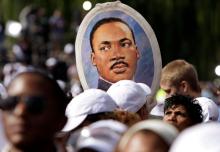
In order to understand King's life and legacy, it is critical that his activism be understood in the context of his call as a minister. In 1956 a sermon titled, “Paul's Letter to American Christians,” King called for a “better distribution of wealth.” He also asserted that “God never intended one people to live in superfluous inordinate wealth, while others live in abject deadening poverty.” Holistically interpreting King’s theological work as a pastor, public theologian, and faith leader requires grounding his anti-capitalism in his self-identification as a “minister of the Christian gospel.”